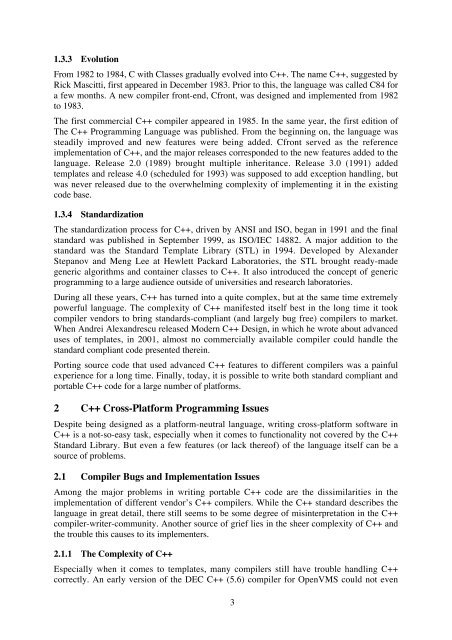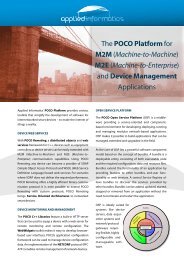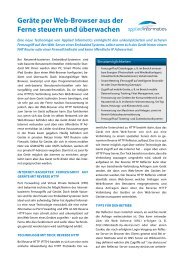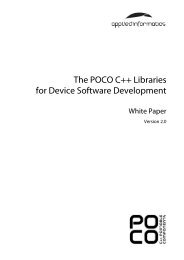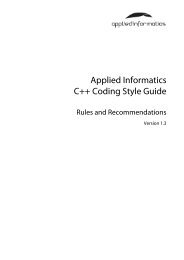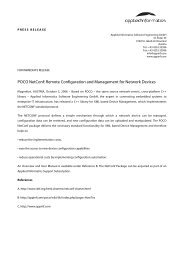Designing and Building Portable Systems in C++ - Applied Informatics
Designing and Building Portable Systems in C++ - Applied Informatics
Designing and Building Portable Systems in C++ - Applied Informatics
Create successful ePaper yourself
Turn your PDF publications into a flip-book with our unique Google optimized e-Paper software.
1.3.3 Evolution<br />
From 1982 to 1984, C with Classes gradually evolved <strong>in</strong>to <strong>C++</strong>. The name <strong>C++</strong>, suggested by<br />
Rick Mascitti, first appeared <strong>in</strong> December 1983. Prior to this, the language was called C84 for<br />
a few months. A new compiler front-end, Cfront, was designed <strong>and</strong> implemented from 1982<br />
to 1983.<br />
The first commercial <strong>C++</strong> compiler appeared <strong>in</strong> 1985. In the same year, the first edition of<br />
The <strong>C++</strong> Programm<strong>in</strong>g Language was published. From the beg<strong>in</strong>n<strong>in</strong>g on, the language was<br />
steadily improved <strong>and</strong> new features were be<strong>in</strong>g added. Cfront served as the reference<br />
implementation of <strong>C++</strong>, <strong>and</strong> the major releases corresponded to the new features added to the<br />
language. Release 2.0 (1989) brought multiple <strong>in</strong>heritance. Release 3.0 (1991) added<br />
templates <strong>and</strong> release 4.0 (scheduled for 1993) was supposed to add exception h<strong>and</strong>l<strong>in</strong>g, but<br />
was never released due to the overwhelm<strong>in</strong>g complexity of implement<strong>in</strong>g it <strong>in</strong> the exist<strong>in</strong>g<br />
code base.<br />
1.3.4 St<strong>and</strong>ardization<br />
The st<strong>and</strong>ardization process for <strong>C++</strong>, driven by ANSI <strong>and</strong> ISO, began <strong>in</strong> 1991 <strong>and</strong> the f<strong>in</strong>al<br />
st<strong>and</strong>ard was published <strong>in</strong> September 1999, as ISO/IEC 14882. A major addition to the<br />
st<strong>and</strong>ard was the St<strong>and</strong>ard Template Library (STL) <strong>in</strong> 1994. Developed by Alex<strong>and</strong>er<br />
Stepanov <strong>and</strong> Meng Lee at Hewlett Packard Laboratories, the STL brought ready-made<br />
generic algorithms <strong>and</strong> conta<strong>in</strong>er classes to <strong>C++</strong>. It also <strong>in</strong>troduced the concept of generic<br />
programm<strong>in</strong>g to a large audience outside of universities <strong>and</strong> research laboratories.<br />
Dur<strong>in</strong>g all these years, <strong>C++</strong> has turned <strong>in</strong>to a quite complex, but at the same time extremely<br />
powerful language. The complexity of <strong>C++</strong> manifested itself best <strong>in</strong> the long time it took<br />
compiler vendors to br<strong>in</strong>g st<strong>and</strong>ards-compliant (<strong>and</strong> largely bug free) compilers to market.<br />
When Andrei Alex<strong>and</strong>rescu released Modern <strong>C++</strong> Design, <strong>in</strong> which he wrote about advanced<br />
uses of templates, <strong>in</strong> 2001, almost no commercially available compiler could h<strong>and</strong>le the<br />
st<strong>and</strong>ard compliant code presented there<strong>in</strong>.<br />
Port<strong>in</strong>g source code that used advanced <strong>C++</strong> features to different compilers was a pa<strong>in</strong>ful<br />
experience for a long time. F<strong>in</strong>ally, today, it is possible to write both st<strong>and</strong>ard compliant <strong>and</strong><br />
portable <strong>C++</strong> code for a large number of platforms.<br />
2 <strong>C++</strong> Cross-Platform Programm<strong>in</strong>g Issues<br />
Despite be<strong>in</strong>g designed as a platform-neutral language, writ<strong>in</strong>g cross-platform software <strong>in</strong><br />
<strong>C++</strong> is a not-so-easy task, especially when it comes to functionality not covered by the <strong>C++</strong><br />
St<strong>and</strong>ard Library. But even a few features (or lack thereof) of the language itself can be a<br />
source of problems.<br />
2.1 Compiler Bugs <strong>and</strong> Implementation Issues<br />
Among the major problems <strong>in</strong> writ<strong>in</strong>g portable <strong>C++</strong> code are the dissimilarities <strong>in</strong> the<br />
implementation of different vendor’s <strong>C++</strong> compilers. While the <strong>C++</strong> st<strong>and</strong>ard describes the<br />
language <strong>in</strong> great detail, there still seems to be some degree of mis<strong>in</strong>terpretation <strong>in</strong> the <strong>C++</strong><br />
compiler-writer-community. Another source of grief lies <strong>in</strong> the sheer complexity of <strong>C++</strong> <strong>and</strong><br />
the trouble this causes to its implementers.<br />
2.1.1 The Complexity of <strong>C++</strong><br />
Especially when it comes to templates, many compilers still have trouble h<strong>and</strong>l<strong>in</strong>g <strong>C++</strong><br />
correctly. An early version of the DEC <strong>C++</strong> (5.6) compiler for OpenVMS could not even<br />
3


